- Home
- John le Carré
The Night Manager
The Night Manager Read online
PRAISE FORTHE NIGHT MANAGER
A NEW YORK TIMES BESTSELLER
“Triumphant. . . . A splendid read. . . . Le Carré has given us a gutsy new hero . . . and a sinister but charming villain.”
—Toronto Sun
“A story complex and intense enough to carry both the philosophical weight and the page-turning tension that, combined, make him the supreme tale-teller he is.”
—San Francisco Chronicle
“Since the death of Graham Greene, John le Carré has become the only author in the world ready and able to raise the doings of spies to the level of literature. The Night Manager . . . burnishes an already glittering reputation. . . . Le Carré’s sharply observed prose pictures are more than a match for his intricate plot.”
—The Vancouver Sun
“A marvellously observed relentless tale.”
—The Observer
“Memorable . . . an uncanny sense of authenticity.”
—Maclean’s
“Exuberantly dismisses any question that his talent depended on the Cold War to display itself. . . . The tale is marvelously told . . . super.”
—The Globe and Mail
“Le Carré is back in the ring . . . superb.”
—The Calgary Sun
“[Le Carré] has no superiors and few equals among living novelists.”
—The New York Times Book Review
“Rousing. . . . When John le Carré is good, he is oh so good. In The Night Manager, he is at his best.”
—Calgary Herald
“Reaffirms le Carré’s status as one of the top spy novelists, ever.”
—The Windsor Star
“A beautifully polished, utterly knowing, and palpitating book.”
—Time
“Le Carré is the equal of any novelist now writing in English.”
—The Guardian
“Fascinating . . . provides more than a few frissons, and something to think about besides.”
—NOW Magazine (Toronto)
“The Night Manager . . . sees the master of the spy story at the height of his powers. . . . [Le Carré] is obsessed by the great movements of contemporary history, of which his novels are a fictional chronicle [and] a moral parable.”
—Telegraph Magazine (London)
“Authoritative . . . Le Carré tells us not only the best way to add salt to a dish, but the most effective way to administer torture.”
—Toronto Star
“Hypnotic . . . Le Carré is as elegant and slippery here as if still siccing Smiley on Moscow Central. . . . Le Carré rises to the new occasion with unfailing coolness and sangfroid.”
—The Province (Vancouver)
PENGUIN CANADA
THE NIGHT MANAGER
JOHN LE CARRÉ was born in 1931. He was educated at the Universities of Bern and Oxford, taught at Eton College, and served as Second Secretary at the British Embassy in Bonn and British Consul in Hamburg during the Cold War. His third novel, The Spy Who Came in from the Cold, secured him a wide reputation, which was consolidated by his trilogy Tinker, Tailor, Soldier, Spy; The Honourable Schoolboy; and Smiley’s People. His recent work includes The Tailor of Panama, The Constant Gardener, and The Mission Song. His new novel, A Most Wanted Man, will be published in autumn 2008.
ALSO BY JOHN LE CARRÉ
Call for the Dead
A Murder of Quality
The Spy Who Came in from the Cold
The Looking Glass War
A Small Town in Germany
The Naïve and Sentimental Lover
Tinker, Tailor, Soldier, Spy
The Honourable Schoolboy
Smiley’s People
The Little Drummer Girl
A Perfect Spy
The Russia House
The Secret Pilgrim
Our Game
Single & Single
The Constant Gardner
Absolute Friends
The Mission Song
JOHN LE CARRÉ
THE NIGHT MANAGER
PENGUIN CANADA
Published by the Penguin Group
Penguin Group (Canada), 90 Eglinton Avenue East, Suite 700, Toronto, Ontario, Canada M4P 2Y3 (a division of Pearson Canada Inc.)
Penguin Group (USA) Inc., 375 Hudson Street, New York, New York 10014, U.S.A.
Penguin Books Ltd, 80 Strand, London WC2R 0RL, England
Penguin Ireland, 25 St Stephen’s Green, Dublin 2, Ireland (a division of Penguin Books Ltd)
Penguin Group (Australia), 250 Camberwell Road, Camberwell, Victoria 3124, Australia (a division of Pearson Australia Group Pty Ltd)
Penguin Books India Pvt Ltd, 11 Community Centre, Panchsheel Park, New Delhi – 110 017, India
Penguin Group (NZ), 67 Apollo Drive, Rosedale, North Shore 0632, New Zealand (a division of Pearson New Zealand Ltd)
Penguin Books (South Africa) (Pty) Ltd, 24 Sturdee Avenue, Rosebank, Johannesburg 2196, South Africa
Penguin Books Ltd, Registered Offices: 80 Strand, London WC2R 0RL, England
First published in a Viking Canada hardcover by Penguin Group (Canada), a division of Pearson Canada Inc., 1993
Published in Penguin Canada paperback by Penguin Group (Canada), a division of Pearson Canada Inc., 1994
Published in this edition, 2008
1 2 3 4 5 6 7 8 9 10 (WEB)
Copyright © David Cornwell, 1993
All rights reserved. Without limiting the rights under copyright reserved above, no part of this publication may be reproduced, stored in or introduced into a retrieval system, or transmitted in any form or by any means (electronic, mechanical, photocopying, recording or otherwise), without the prior written permission of both the copyright owner and the above publisher of this book.
Publisher’s note: This book is a work of fiction. Names, characters, places and incidents either are the product of the author’s imagination or are used fictitiously, and any resemblance to actual persons living or dead, events, or locales is entirely coincidental.
Manufactured in Canada.
* * *
LIBRARY AND ARCHIVES CANADA CATALOGUING IN PUBLICATION
Le Carré, John, 1931–
The night manager / John le Carre.
ISBN 978-0-14-316954-3
I. Title.
PR6062.E42N54 2008 823'.914 C2008-902726-4
* * *
Except in the United States of America, this book is sold subject to the condition that it shall not, by way of trade or otherwise, be lent, re-sold, hired out, or otherwise circulated without the publisher’s prior consent in any form of binding or cover other than that in which it is published and without a similar condition including this condition being imposed on the subsequent purchaser.
Visit the Penguin Group (Canada) website at www.penguin.ca
Special and corporate bulk purchase rates available; please see www.penguin.ca/corporatesales or call 1-800-810-3104, ext. 477 or 474
For Graham Goodwin in memory
1
On a snow-swept January evening of 1991, Jonathan Pine, the English night manager of the Hotel Meister Palace in Zurich, forsook his office behind the reception desk and, in the grip of feelings he had not known before, took up his position in the lobby as a prelude to extending his hotel’s welcome to a distinguished late arrival. The Gulf war had just begun. Throughout the day, news of the Allied bombings, discreetly relayed by the staff, had caused consternation on the Zurich stock exchange. Hotel bookings, which in any January were low, had sunk to crisis levels. Once more in her long history Switzerland was under siege.
But the Meister Palace was equal to the challenge. Over all Zurich, “Meister,” as the hotel was affectionately known to taxi-drivers and habitués, presided physically and tr
aditionally alone, a staid Edwardian aunt perched on her own hilltop, gazing down on the folly of hectic urban life. The more things changed in the valley, the more Meister stayed herself, unbending in her standards, a bastion of civilized style in a world intent on going to the devil.
Jonathan’s point of vantage was a small recess between the hotel’s two elegant showcases, both of them displaying ladies’ fashions. Adèle of the Bahnhofstrasse was offering a sable stole over a female dummy whose only other protection was a gold bikini bottom and a pair of coral earrings, price on application to the concierge. The clamor against the use of animal furs these days is as vocal in Zurich as in other cities of the Western world, but the Meister Palace paid it not a blind bit of notice. The second showcase—by César, likewise of the Bahnhofstrasse—preferred to cater for the Arab taste, with a tableau of lusciously embroidered gowns and diamanté turbans and jeweled wristwatches at sixty thousand francs a shot. Flanked by these wayside shrines to luxury, Jonathan was able to keep a crisp eye on the swing doors.
He was a compact man but tentative, with a smile of apologetic self-protection. Even his Englishness was a well-kept secret. He was nimble and in his prime of life. If you were a sailor you might have spotted him for another, recognized the deliberate economy of his movements, the caged placing of the feet, one hand always for the boat. He had trim curled hair and a pugilist’s thick brow. The pallor of his eyes caught you by surprise. You expected more challenge from him, heavier shadows.
And this mildness of manner within a fighter’s frame gave him a troubling intensity. You would never during your stay in the hotel confuse him with anybody else: not with Herr Strippli, the creamy-haired front-of-house manager, not with one of Herr Meister’s superior young Germans, who strode through the place like gods on their way to stardom somewhere else. As a hotelier Jonathan was complete. You did not wonder who his parents were or whether he listened to music or kept a wife and children or a dog. His gaze as he watched the door was steady as a marksman’s. He wore a carnation. At night he always did.
The snow, even for the time of year, was formidable. Fat billows swept across the lighted forecourt like white waves in a tempest. The chasseurs, alerted for a grand arrival, stared expectantly into the blizzard. Roper will never make it, Jonathan thought. Even if they let his plane take off it can never have landed in this weather. Herr Kaspar has got it wrong.
But Herr Kaspar, the head concierge, had never got anything wrong in his life. When Herr Kaspar breathed “Arrival imminent” over the internal speaker, only a congenital optimist could imagine that the client’s plane had been diverted. Besides, why else would Herr Kaspar be presiding at this hour, except for a big spender? There was a time, Frau Loring had told Jonathan, when Herr Kaspar would maim for two francs and strangle for five. But old age is a different state. These days, only the richest pickings were able to lure Herr Kaspar from the pleasures of his evening television.
Hotel’s full up, I’m afraid, Mr. Roper, Jonathan rehearsed in another last-ditch effort to fend off the inevitable. Herr Meister is desolated. A temporary clerk has made an unpardonable error. However, we have managed to obtain rooms for you at the Baur au Lac, et cetera. But that wishful fantasy too was stillborn. There was not a great hotel in Europe tonight that boasted more than fifty guests. The wealthiest of the earth were bravely hugging the ground, with the one exception of Richard Onslow Roper, trader of Nassau, the Bahamas.
Jonathan’s hands stiffened, and he instinctively flicked his elbows as if to ready them for combat. A car, a Mercedes by its radiator, had entered the forecourt, the beams of its headlights choked with swirling snowflakes. He saw Herr Kaspar’s senatorial head lift and the chandelier glint on its pomaded rivers. But the car had parked on the far side of the forecourt. A taxi, a mere city cab, a no one. Herr Kaspar’s head, now glowing with acrylic light, sank forward as he resumed his study of the closing stock prices. In his relief, Jonathan allowed himself a ghostly smile of recognition. The wig, the immortal wig: Herr Kaspar’s one-hundred-and-forty-thousand-franc crown, the pride of every classic concierge in Switzerland. Herr Kaspar’s William Tell of a wig, Frau Loring called it: the wig that had dared to raise itself in revolt against the millionaire despot Madame Archetti.
Perhaps to concentrate his mind while it was tearing him in so many directions, or perhaps because he found in the snow some hidden relevance to his predicament, Jonathan recounted it to himself yet again, exactly as Frau Loring, the head housekeeper, had recounted it the first time she made him cheese fondue in her attic. Frau Loring was seventy-five and came from Hamburg. She had been Herr Meister’s nanny and, as rumor had it, Herr Meister’s father’s mistress. She was the keeper of the legend of the wig, its living witness.
“Madame Archetti was the richest woman in Europe in those days, young Herr Jonathan,” Frau Loring declared, as if she had slept with Jonathan’s father too. “Every hotel in the world was after her. But Meister was her favorite until Kaspar made his stand. After that, well, she still came, but it was only to be seen.”
Madame Archetti had inherited the Archetti supermarket fortune, Frau Loring explained. Madame Archetti lived off the interest on the interest. And what she liked at the age of fifty-something was to tour the great hotels of Europe in her open English sports car, followed by her staff and wardrobe in a van. She knew the names of every concierge and headwaiter from the Four Seasons in Hamburg to the Cipriani in Venice to the Villa d’Este on Lake Como. She prescribed them diets and herbal remedies and acquainted them with their horoscopes. And she tipped them on a scale scarcely to be imagined, provided they found favor.
And favor was what Herr Kaspar found in bucketloads, said Frau Loring. He found it to the tune of twenty thousand Swiss francs each annual visit, not to mention quack hair remedies, magic stones to put beneath his pillow to cure his sciatica, and half kilos of Beluga caviar on Christmas and saints’ days, which Herr Kaspar discreetly converted to cash by means of an understanding with a famous food hall in the town. All this for obtaining a few theater tickets and booking a few dinner tables, on which of course he exacted his customary commission. And for bestowing those pious signals of devotion that Madame Archetti required for her role as chatelaine of the servant kingdom.
Until the day Herr Kaspar bought his wig.
He did not buy it rashly, said Frau Loring. He bought land in Texas first, thanks to a Meister client in the oil business. The investment flourished, and he took his profit. Only then did he decide that like his patroness he had reached a stage in life where he was entitled to shed a few of his advancing years. After months of measuring and debate, the thing was ready—a wonder wig, a miracle of artful simulation. To try it out he availed himself of his annual holiday on Mykonos, and one Monday morning in September he reappeared behind his desk, bronzed and fifteen years younger as long as you didn’t look at him from the top.
And no one did, said Frau Loring. Or if they did they didn’t mention it. The amazing truth was, no one mentioned the wig at all. Not Frau Loring, not André, who was the pianist in those days, not Brandt, who was the predecessor of Maître Berri in the dining room, not Herr Meister senior, who kept a beady eye for deviations in the appearance of his staff. The whole hotel had tacitly decided to share in the glow of Herr Kaspar’s rejuvenation. Frau Loring herself risked her all with a plunging summer frock and a pair of stockings with fern-pattern seams. And things continued happily this way until the evening Madame Archetti arrived for her customary month’s stay, and as usual her hotel family lined up to greet her in the lobby. Frau Loring, Maître Brandt, André and Herr Meister senior, who was waiting to conduct her personally to the Tower Suite.
And at his desk Herr Kaspar in his wig.
To begin with, said Frau Loring, Madame Archetti did not permit herself to notice the addition to her favorite’s appearance. She smiled at him as she swept past, but it was the smile of a princess at her first ball, bestowed on everyone at once. She permitted Herr Meister to kis
s her on both cheeks, Maître Brandt on one. She smiled at Frau Loring. She placed her arms circumspectly round the undeveloped shoulders of André the pianist, who purred, “Madame.” Only then did she approach Herr Kaspar.
“What are we wearing on our head, Kaspar?”
“Hair, Madame.”
“Whose hair, Kaspar?”
“It is mine,” Herr Kaspar replied with bearing.
“Take it off,” Madame Archetti ordered. “Or you will never have another penny from me.”
“I cannot take it off, Madame. My hair is part of my personality. It is integrated.”
“Then dis-integrate it, Kaspar. Not now—it is too complicated—but for tomorrow morning. Otherwise nothing. What have you got at the theater for me?”
“Othello, Madame.”
“I shall look at you again in the morning. Who is playing him?”
“Leiser, Madame. The greatest Moor we have.”
“We shall see.”
Next morning at eight o’clock to the minute Herr Kaspar appeared for duty, his crossed keys of office glinting like campaign medals from his lapels. And on his head, triumphantly, emblem of his insurrection. All morning long a precarious hush prevailed at the lobby. The hotel guests, like the famous geese of Freiburg, said Frau Loring, were aware of the imminent explosion even if they did not know its cause. At midday, which was her hour, Madame Archetti emerged from the Tower Suite and descended the staircase on the arm of her prevailing swain, a promising young barber from Graz.
“But where is Herr Kaspar this morning?” she asked in Herr Kaspar’s vague direction.
“He is behind his desk and at your service as ever, Madame,” Herr Kaspar replied in a voice that, to those who heard it, echoed for all time in the halls of freedom. “He has the tickets for the Moor.”
“I see no Herr Kaspar,” Madame Archetti informed her escort, “I see hair. Tell him, please, we shall miss him in his obscurity.”
“It was his trumpet blast,” Frau Loring liked to end. “From the moment that woman entered the hotel, Herr Kaspar could not escape his destiny.”

 The Honorable Schoolboy
The Honorable Schoolboy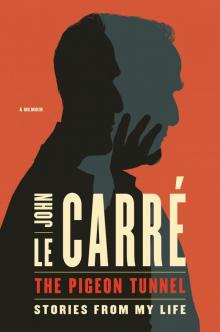 The Pigeon Tunnel: Stories From My Life
The Pigeon Tunnel: Stories From My Life Single & Single
Single & Single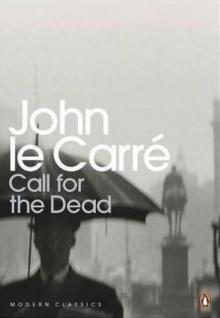 The Spy Who Came in From the Cold
The Spy Who Came in From the Cold The Looking Glass War
The Looking Glass War The Night Manager
The Night Manager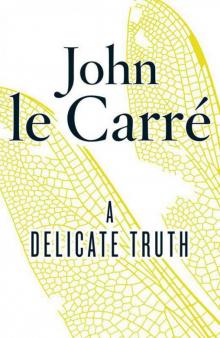 A Delicate Truth
A Delicate Truth A Perfect Spy
A Perfect Spy The Little Drummer Girl
The Little Drummer Girl Absolute Friends
Absolute Friends A Murder of Quality AND Call for the Dead
A Murder of Quality AND Call for the Dead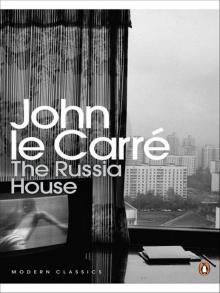 The Russia House
The Russia House The Tailor of Panama
The Tailor of Panama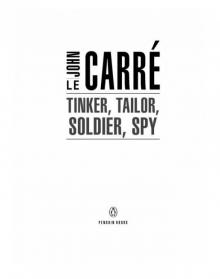 Tinker, Tailor, Soldier, Spy
Tinker, Tailor, Soldier, Spy A Legacy of Spies
A Legacy of Spies The Mission Song
The Mission Song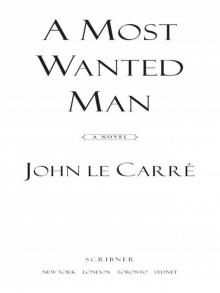 A Most Wanted Man
A Most Wanted Man John Le Carré: Three Complete Novels
John Le Carré: Three Complete Novels The Secret Pilgrim
The Secret Pilgrim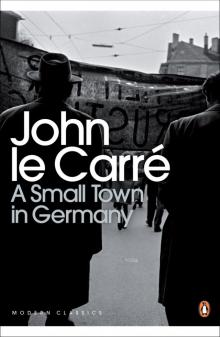 A Small Town in Germany
A Small Town in Germany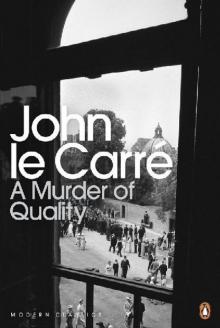 A Murder of Quality
A Murder of Quality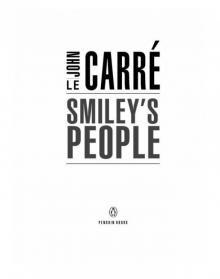 Smiley's People
Smiley's People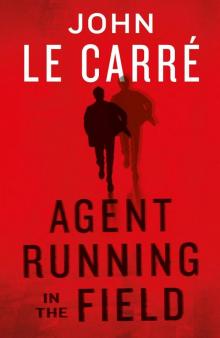 Agent Running in the Field
Agent Running in the Field The Spy Who Came in from the Cold s-3
The Spy Who Came in from the Cold s-3 The Pigeon Tunnel
The Pigeon Tunnel The Russia House - 13
The Russia House - 13 The Honourable Schoolboy
The Honourable Schoolboy Call For The Dead s-1
Call For The Dead s-1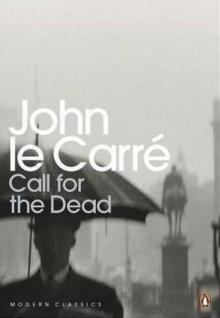 Call for the Dead
Call for the Dead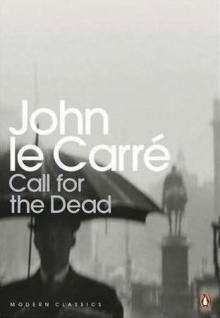 Call for the Dead - 1
Call for the Dead - 1